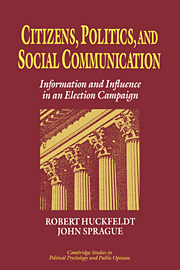Book contents
- Frontmatter
- Contents
- Acknowledgments
- I Democratic politics and social communication
- II Electoral dynamics and social communication
- III Networks, political discussants, and social communication
- IV The organizational locus of social communication
- 11 One-party politics and the voter revisited: Strategic and behavioral bases of partisanship
- 12 Political parties and electoral mobilization: Political structure, social structure, and the party canvass
- 13 Alternative contexts of political preference
- 14 Political consequences of interdependent citizens
- Bibliography
- Index
11 - One-party politics and the voter revisited: Strategic and behavioral bases of partisanship
Published online by Cambridge University Press: 22 March 2010
- Frontmatter
- Contents
- Acknowledgments
- I Democratic politics and social communication
- II Electoral dynamics and social communication
- III Networks, political discussants, and social communication
- IV The organizational locus of social communication
- 11 One-party politics and the voter revisited: Strategic and behavioral bases of partisanship
- 12 Political parties and electoral mobilization: Political structure, social structure, and the party canvass
- 13 Alternative contexts of political preference
- 14 Political consequences of interdependent citizens
- Bibliography
- Index
Summary
What are the consequences of one-party politics for the behavior of individual citizens? How do these individual-level consequences serve to perpetuate one-party dominance? One important mechanism of this self-perpetuation is the institutionally disadvantaged position of the minority party, particularly with respect to the participatory incentives attached to primary election participation. Our argument is as follows: (1) The best way for a minority partisan to maximize her influence in a primary election is often to vote the majority party's primary ballot. But (2) as a result of such crossover voting the minority party loses an important manifestation of support – participation in its own primary election. And thus (3) the minority party demonstrates a level of support that greatly exaggerates the extent to which it is a minority. Furthermore, (4) many individuals who participate in majority party affairs by voting in majority party primaries are likely to develop loyalties to the majority party.
What are the consequences of local one-party politics for the behavior of individual citizens? How do these individual-level consequences serve to perpetuate one-party dominance? These questions are as important today as when they were first addressed by V. O. Key (1949), Alexander Heard (1952), Warren Miller (1956), and Robert Putnam (1966). Arguments to the contrary notwithstanding, American politics has not been fully nationalized, and American citizens do not reside in local communities that are politically indistinguishable. Indeed, relatively few of us live in communities that are genuinely competitive in local political contests.
- Type
- Chapter
- Information
- Citizens, Politics and Social CommunicationInformation and Influence in an Election Campaign, pp. 207 - 228Publisher: Cambridge University PressPrint publication year: 1995

